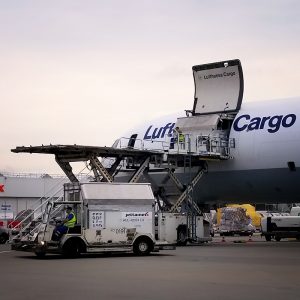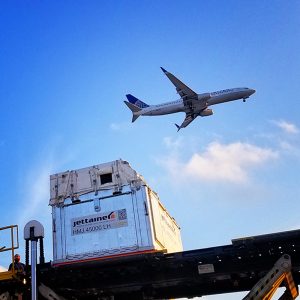Freight Forwarding Agent
Whether you are shipping a beloved pet or your riding horse, a Black Type race horse, or a National Show Horse, Vanessa Moreau-Sipiere is on call to help. As there are many things to know when shipping a horse to and from the United States, Vanessa explains to Horsereporter (HR) what she does and why she does it.
HR: Vanessa, you are a boutique freight forwarding agent. It sounds complicated and fascinating. Can you tell us how you began in the business?
VMS: My parents had exported for many years, and working with them over that time, I was able to see what it took to put a horse on a plane and send him to another part of the world.
My Mother, Randi, had a horse growing up in Kansas, and my father’s parents bred Arabians in France. My parents met in Texas and we all work well together. My Mother does the testing and the paperwork and coordination, my Father, Eric, does much of the marketing, and I fly the horses.
HR: When did you take your first trip?
VMS: I took my first horse shipping trip when I was 20 years old. [Vanessa turned 30 in January.]
HR: How have you refined your business to be the best in what you do?
VMS: My parents weren’t happy with their shipping arrangements, so I started my own company to be a shipping broker to fill a void that I saw.
I only ship animals, and horses are the majority of my business. I am able to be at the airport for each shipment and make certain the paperwork is correct and work through any issues that may arise.
HR: Vanessa, we know you now ship horses from the George Bush Intercontinental Airport in Houston, Texas, but you live near Dallas. Tell us about your work with the Dallas Fort Worth airport to open an export inspection facility.
VMS: USDA inspects the horses before every flight. so the DFW site will be a barn set up with all facilities. The proposed location will be right at the airport cargo warehouses allowing the crates and stalls to be transported directly from the facility to the aircrafts. We are working to find a location and work through the legalities for an opening in late 2018 or early 2019.
HR: Can you walk us through the process if we wish to ship a horse out of the USA?
VMS: Most often the shipper works with the horse owner and agents to transport the horse to their facility to begin the quarantine. The shipper is my client. I am the middle person between the shipper and the airline. I arrange the flights depending on the quarantine for that particular country and negotiate with the airlines for the best pricing for the destination.
I have some of the best Middle Eastern shipping rates, as that is a high volume area for me. Centurion Stud is my parent’s farm and they own and operate their own quarantine facility. My mother arranges testing and paperwork, and then I take over for the airline reservations and coordinate with the veterinarian at the airport and the inspection facility.
HR: Do you fly with the horses?
VMS: I often act as the flying groom. One of the reasons I started flying 10 years ago was the chance to travel and see the world.
HR: What might be a typical flight?
VMS: I meet the horses at the inspection/loading area at the airport. The USDA Veterinarian does an inspection and I finalize the documents for the flight. A few hours before departure horses get loaded and the airline does a loading scheme to properly balance the weight of all the cargo on the plane. Going into or through Europe, we transfer through several cities depending on the airline. Often there is a day layover and I fly with the horses on these trips. The 777, one of the common cargo planes we are often on, has a cockpit and seats for 4 or 6 passengers in front. There are access doors to go into the back to check on the horses and give them water. We only give hay in nets and they have hay for the entire trip but no grain. Any passengers are served the same food that the caterer gives the flying crew.
Heading to Europe on Lufthansa, we will land in Frankfurt, Germany. Once we land, there is a nice transit animal hotel with three separate areas including an import stable, an export stable and a transit stable, all separate from one another. The horses are isolated and after they are offloaded, they are kept in separate stalls. Lufthansa has a team helping with the horses and taking care of them during their stay. If the horses are staying in Europe, after being cleared they will get in a truck to go to their destination. It is much easier for the horses to travel by truck through Europe. Sometimes the owners/handlers are able to come pick them up. The local agent will arrange the customs and import documents and can arrange shipping from Frankfurt to the new destination.
If the horses are going to the Middle East such as Dubai, there are a few different locations where we might disembark depending on the airline. Lufthansa goes to Sharjah, Eithad goes to Abu Dhabi, and Dubai uses the Dubai World Cargo Center. If traveling to Qatar, the flight will depart from Houston, there will be a two-hour layover at Liege, Belgium, where horses stay on the plane and then we go direct to Doha. They have a wonderful facility in Doha with everything we need. If we are going on to Kuwait, the horses will stay in Doha for the night and then go on to Kuwait. When there is a break in travel, the horses rest off the plane, and we will reload them in traveling stalls and fill hay nets and refill water containers. The stalls are always cleaned in between use.
HR: Can you give us some idea of the pricing for shipping a horses or horses?
VMS:The jet stalls are set up to take three average sized horses, and shipping three gives the best pricing. One will pay the same price for one horse or three horses shipped in the same stall. The air freight rate will be about $15,000 to the Middle East and $9,000 to Europe, not including the quarantine and necessary health requirements that need to be met in order to enter the different countries. My fee will be included in the final quoted price. In addition, a traveling groom might charge another $3,500. That fee includes the cost for the groom to stay overnight in a hotel, expenses, and their return flight home.
HR: Have you ever had any problems with a horses(s) that was upset while flying?
VMS: All of my grooms carry some type of tranquilizer, just something to chill out an anxious horse. Many times the shipper knows the horses and we are advised on what is needed to make the horse comfortable. As many of the horses that are being shipped have already gone through quarantine for 30 days, we usually know their quirks. We also carry a first aid kit.
HR: What is the best part of travel with the horses?
VMS: My first flight ever was to the Middle East when I was 20 years old. I had often been to Europe with my father before, but the Middle East was very different and I had no idea what to expect.
I found that it was interesting to speak to the people and find out how things work in another part of the world. Having that connection with the horsemen and being able to see their respectful treatment of horses was heartening. The horses usually have better accommodations than you had with your college room.
HR: Your most memorable trip?
VMS: My most memorable trip so far was the trip to Israel in October 2017. That was exciting as we were able to open this as a new market. Not only was it Lufthansa’s first trip shipping horses into Israel, but mine as well. Lufthansa stepped up beautifully. They have shipped horses around the world for many years and know what they are doing. They took the consignee to the airport and made them comfortable with their entire operation well before the arrival of the flight.
HR: You took three show Arabians from the US to Israel that were sold to that country. Tell us more about that country and Arabian horses?
VMS: They quarantine in Israel upon arrival. A stallion and two fillies left here after a show. From the vet testing and clearance forward to when they arrived took a week and a half and they were still in show condition. The testing and quarantine at that end takes about 5 days.
I found in Israel there was definitely an appreciation for the horses. The agents were very concerned to have the horses safe and comfortable, and their equipment was nice and new. Unfortunately on this trip, I did not have much time to stay as I had another trip booked immediately after.
HR: Is it unusual to have a lady freight forwarder as an agent?
VM: What is more unusual is that I might not get the recognition because of my age. As I have now been in the business for over 10 years, many people are now familiar with my background experience with horses, as well as my record for travel and shipping. There are many women in the horse world, but experience is crucial.
HR: Any advice to give to those who wish to ship horses?
VMS: One of the largest frustrations is that many clients do not understand all that goes into shipping a live animal. We are not shipping a box of clothing overseas.There is a great deal of paperwork and coordination that takes time and effort. The USDA works with different countries and ministries around the world to make certain that we are not trading diseases and problems. This is why there is testing and quarantine needed.
HR: Does the horse need a passport to travel?
VMS: If a horse is staying in the new country, he will not need a passport to easily enter. If the horse will be in and out, such as in a competition horse, a passport is issued from the US and travels with the horse. On a purchase, when a horses’s registration is transferred to the new owner, the US registry sends the passport to the local registry.
HR: And what does one need If importing a horse into the USA?
VMS: In the case of import, quarantine rules are different. A customs broker is needed to handle the customs in America to prevent delays. As an agent, I would work with the shipper to apply for the proper permits and make the arrangements for USDA to come and make their inspections. There is a quarantine upon arrival and depending on what diseases might be present in the originating country, will determine the length of isolation and testing done. There are only a few ports approved for imports: New York, Miami, Chicago, and Los Angeles.
Note: When preparing to ship horses, make certain that you have the correct paperwork including passports for all countries, and have all horse health papers and inoculations current according to the USDA guidelines. You will need shipping boots and blankets, horse id on halter or headstall, and allow ample time to get to your destination with time for quarantines and shipping routes.
To reach Vanessa with questions email: [email protected]





